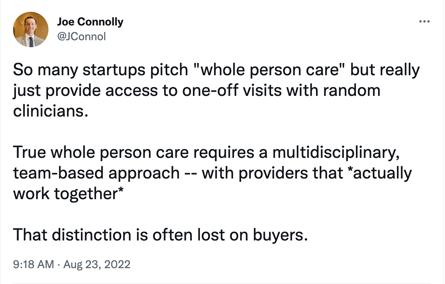What Does It Really Mean To Deliver ‘Whole-Person Care’?
Startups can be guilty of making aspirational claims on their websites and pitch decks. However, in an industry like healthcare, it’s critical that startups are actually able to deliver on the promises they make. The stakes are just too high.
I thought about this recently when Joe Connolly, CEO of the virtual gynecology care provider, Visana Health, tweeted:

I was glad that Connolly articulated this. “Whole-person care” is a term that gets thrown around a lot today, as a kind of virtue signaling for more personalized forms of care. But true whole-person care is not a buzzword; it’s a complex delivery model that engages an integrated multidisciplinary team on the patient’s behalf. I also believe strongly that whole-person care goes beyond clinical concerns to treat the patient as a human being with health challenges that must be addressed holistically, not as a disease or set of conditions that gets divvied up among different clinicians and specialists.
A meaningful and accurate definition is important to us at Thyme Care, because our goal is to transform oncology with a practical and effective whole-person care model that supports both patients and their care teams.
Let me describe what whole-person care means to us. And, please, hold us to our aspirations.
The Human Side of a Powerful Care Model
First, a definition: Whole-person care is a practical framework for care delivery that emphasizes the interconnectedness between body, mind, spirit, and environment. It aims to enhance the experience of care for individuals and their care providers.
The contrast with traditional medical practice is revealing. Until the 1970s, medicine operated primarily under a bio-medical model that reduced patients to their disease states. That framework began to shift when psychologists, researchers and clinicians came to appreciate the influence that psychological and socio-environmental factors also have on illness and disease. Unfortunately, this bio-psycho-social (BPS) model has failed to live up to its promise, in large part because care delivery remains siloed, impeding provider teamwork and integration.
Today, the medical profession has a deeper understanding of how social, physical, mental and spiritual factors influence human health, but still struggles to implement whole-person care. At Thyme Care, we’ve developed a whole-person care delivery model for cancer care that brings care teams, providers and community organizations together to deliver on members’ holistic needs throughout their care journey.
Picture a person recently diagnosed with cancer. They may still be in shock and overwhelmed by worries and concerns, or they may be more engaged with their health than they’ve ever been. Regardless, our whole-person care model begins with a conversation with the member about their priorities, hopes, fears and goals. In this way, our care team is able to learn a great deal about the member’s life, relationships, and home environment, as well as how resilient they’re feeling and the level of support they’re able to rely on.
Human compassion is at the heart of this model. Our care partners are, by nature, empathetic, curious, emotionally intelligent people who are trained to have conversations that elicit engaged responses and form deep and lasting connections.
Only after we understand the member as a human being do we move on to the disease. People with cancer are used to talking almost exclusively about their disease as they go from doctor to doctor. This makes cancer central to their identity. In practicing whole-person care, we’re trying to turn that around. The person is central; having cancer is one part of their human experience.
Serving as the Connective Tissue
With a deep and well-rounded understanding of the member as a person, our care team is able to help address the member’s holistic needs along their care journey. That requires a team-based approach, as Joe Connolly put it, “with providers that actually work together.” In other words, whole-person care is not simply a system for providing isolated referrals, appointment scheduling and transportation. It requires a deeply integrated network of providers and supporting teams equipped to assess and address holistic needs across multiple touch points.
At Thyme Care, our care team coordinates care across different specialty teams, all while helping those providers better understand the member’s needs. They also keep the primary care physician deeply involved and enlist the support of community organizations that can provide support services such as transportation, access to nutritious food, behavioral health treatment, and financial grants. That care team stays with the member over the course of their care journey, adjusting the level of support as needs and circumstances change. This is possible because our care teams are organized by geography and thus become embedded in the communities they serve.
A lot of healthcare organizations, particularly early-stage technology companies, believe they’re delivering whole-person care, but they build their services off a technology platform, then layer a human component overtop. I believe this is backwards. When deep relationships with high-value providers and community organizations are not in place, providers will feel ill-equipped to deliver on holistic needs and members will feel frustrated and disengaged when their needs are not understood or addressed.
At Thyme Care, our sophisticated technology platform is built in service of the people who deliver care, reducing their administrative burden, coordinating their efforts, and identifying and flagging member needs as early as possible. This technology infrastructure improves care quality, reduces costs, enhances member experience, extends the reach of care teams, and enables whole-person care to be practiced at scale.
Whole-person care brings the humanity back to healthcare by giving providers and members a better care journey and experience. At Thyme Care, we believe that’s the future of oncology care – but to get there, healthcare organizations must understand what whole-person care and a team-based approach really mean.
To view original post, visit MedCity News.

![[Blog_CTA]_[Poster]_[V6]](https://blog.thymecare.com/hs-fs/hubfs/%5BBlog_CTA%5D_%5BPoster%5D_%5BV6%5D.png?width=1600&height=420&name=%5BBlog_CTA%5D_%5BPoster%5D_%5BV6%5D.png)